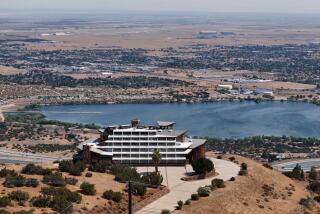Rough Sailing : Luxury Lure of Yachts Is No Longer Enough
- Share via
Martin Ranck traveled to the Ventura Harbor two weeks ago to trade in his 1957 Porsche for a yacht and a new life on the high seas.
Ranck admits that the 30-foot yacht is a luxury item--nobody needs a boat. But the retired commercial pilot from Palmdale takes exception to the notion that only the rich and famous purchase yachts.
“That’s a fallacy,” he said. “I know people that are blue-collar workers that have traded their house for a studio apartment, just so they could afford the luxury of a boat.”
With the belt-tightening of the ‘90s, Ranck’s picture of the blue-collar yachtsman is just what Ventura County yacht salesmen say they need to keep afloat.
Until recently, people in the yachting business were content with the idea of luxury as a lure. But over the past three years--the worst ever in the industry--it has become clear that many otherwise eager customers will not buy a yacht in an uncertain economy.
Since 1990, that fact, combined with other issues, has brought hard times to yacht salesmen in the Ventura and Channel Islands harbors.
Dick Kahn, who owns Ventura Yacht Sales, said as many as half the brokers in the Ventura area are no longer working due to the drought of the past three years. Kahn’s dealership, the area’s largest, has survived, but with deep staff cuts.
“The market has really shriveled up,” Kahn said. “California has been lagging out of the recession and there has been a lot of uncertainty about the economy.”
“I think boating and yachting has suffered more than all the other recreational industries,” said Jack Means, president of the California Boating and Yachting Assn. “This is the worst it’s ever been. It’s even worse than during the fuel crisis in the ‘70s.”
Statewide, the Department of Boating and Waterways reports that the number of licensed yacht brokers has dropped from 586 to 371 since 1986. And Spike Harvey of the Southern California Marine Assn. said the industry had $11 billion in sales in 1992 compared with $18 billion in 1988.
Ventura, Harvey said, “probably felt it as bad or worse than everyone else.”
The Ventura area is one of the smaller outposts of the California yachting industry. The majority of business is done out of Newport Beach and Long Beach.
“There just aren’t as many people up in this area as they have down there,” said Bob Merritt, a dealer for Executive Yacht and Ship in Channel Islands Harbor.
“We have to rely on business from outside the area, like people who come from Canada, the Northwest, even from Japan,” Merritt explained. “It’s just a matter of having what the customer wants.”
Kahn said that most of his business comes from within a two-hour radius of the harbor, but very little of it comes from the city of Ventura. “We sell primarily to people from Newbury Park, Westlake, Simi Valley and the San Fernando Valley,” he said.
But even those markets have thinned out in the past few years. At least partially to blame, Kahn said, is a hefty federal tax, known as the luxury tax, which takes 10% from the amount over $100,000 of the cost of a new boat.
The problem with the tax, said Faith O’Leary of Larry Dudley Yacht Sales in Ventura, is the misperception that it applies to all boats, new and used. “People think that no matter what boat they buy they’re going to get taxed.”
The confusion about the tax has kept many potential buyers at home, Kahn said. Congress voted twice to repeal the tax as part of legislative packages that were vetoed by President George Bush. The repeal will be attached to President Clinton’s budget package again this year, and Kahn says that because people think it will ultimately pass, they wait to buy.
“Nobody wants to be the last person in town to pay the luxury tax,” he said. “But the fact is that most of the people who fear it would never be affected by it.”
Other cost factors have also hurt the industry, according to local salesmen. O’Leary pointed out the rise in the price of slip fees. To dock a yacht today costs more than four times as much as it did in the late 1970s, she said.
Also, Kahn noted, local banks have been more reluctant to grant loans to people who would have easily qualified before the recession. And once businesses were going under, liquidating their inventory hurt those that were just trying to survive.
The result is that fewer people are cruising out of Ventura and Channel Island harbors for such popular boating spots as Mexico and the islands off the Santa Barbara coast.
What the people have missed during this drought in yacht purchases is the steady march of technology. Navigation systems that were once available only to the armed forces, O’Leary said, are now on most sailboats.
Kahn said that a typical luxury boat in the 40- to 50-foot range, for example, now has separated state rooms with their own bathrooms and showers, and a social salon area with all the conveniences--microwave oven, trash compactors, etc.
All this is accompanied by sophisticated satellite-navigation equipment. So sophisticated, Kahn said, that in some cases you can simply pick a destination, press a button and the boat will take you there.
Means admits the industry will have a tough time fending off the image of the wealthy yachtsman, especially since yachts such as the one Kahn describes can cost into the hundreds of thousands of dollars.
“Of course, the mid-income buyer is not buying that size boat,” Means said. “Boating can be very reasonably priced. Even some very nice boats would be no different in price than a condo or a second home. With yachts, it’s an illusion of extravagance.”
The typical yacht owner in Ventura, Kahn said, is either a retired professional, “gray at the temples, enjoying his golden years,” or a successful businessman, “someone from manufacturing or ranching or farming.”
Ranck, who will join these “typical owners” in Ventura Harbor, said he is excited about his boat and about the social aspects of the sport.
“It’s real nice down by the docks,” he said. “It’s not like buying a house, where you and your neighbor may have nothing in common. Everyone down there has similar interests.”
As for yachting’s ritzy image, “everyone’s in tennis shoes and T-shirts, and there’s just no telling. And once you’re out on the water, your background means nothing.”
More to Read
Inside the business of entertainment
The Wide Shot brings you news, analysis and insights on everything from streaming wars to production — and what it all means for the future.
You may occasionally receive promotional content from the Los Angeles Times.










